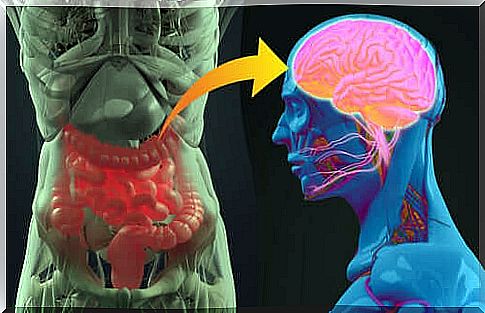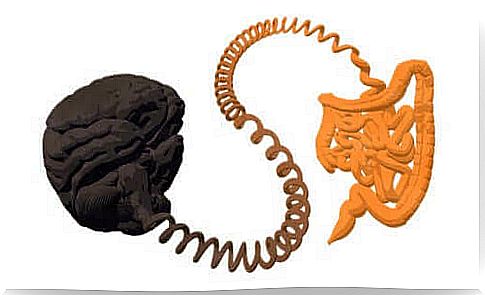Stomach And Brain: How Are They Connected?

We have long known that the stomach and brain are linked together by a deep bond. Until now, however, this relationship was thought to be only one-sided: from the brain to the stomach. What is claimed today by many doctors and researchers, however, is that this relationship could move in both directions.
The gut microbiota could give rise to disorders such as anxiety or diseases such as Alzheimer’s. Gastroenterologist and co-director of the Digestive Diseases Research Center in Los Angeles, Dr. Emeran Mayer, argues that the stomach-brain relationship is much deeper than previously thought. And it would be to the point of saying that both physical and emotional discomfort could originate in the stomach.
How does the relationship between stomach and brain work?
The vagus nerve is the channel that connects the stomach and brain. It is one of the twelve cranial nerves, as well as the one that connects the pharynx, esophagus, larynx, trachea, bronchi, heart, stomach, pancreas, etc. But it also unites other parts of the digestive system where a large number of neurons are present.
The microbes involved in digestion appear to be responsible for sending signals to the brain via the vagus nerve in order to generate responses that stimulate certain eating behaviors.
This aids in the secretion of neurotransmitters such as dopamine and serotonin. Today there are several studies according to which the intestinal microbiota is associated with eating behavior.

How important is the intestinal microbiota?
Research studies are demonstrating the crucial role of the microbiota. Among other functions, it affects weight or, to be more specific, the reasons that lead a person to gain weight or lose weight.
Experiments on mice have given surprising results: it has been seen that by introducing bacteria often present in the intestines of obese people into their diet, mice also gain weight. If, on the other hand, the diet includes bacteria typical of thin people, then the mice lose weight.
In another experiment, mice raised in a sterile environment were used. In this environment it is not possible that certain bacteria can colonize the digestive system. Later, it was observed that the mice exhibited symptoms similar to those of autism in humans.
Psychological disorders and neurogeneration
When there are prolonged stressful situations over time, the stomach reduces its performance, so that the brain can rely on extra energy. This causes less blood flow into the stomach. The mucosa that protects the walls of this organ also appears thinner.
The bacteria therefore come into excessive contact with the intestinal walls and release chemicals responsible for inflammation. Following this, the gut microbiota begins to produce various metabolites which are sent to the brain.
Harvard University has published the latest findings on the relationship between the stomach and the brain. Experts have shown that, based on specific eating habits, gut microbes produce certain substances that travel to the brain.
These molecules act on astrocytes. This step would seem to block the inflammation processes responsible for neurodegeneration that cause diseases such as Alzheimer’s or Parkinson’s.
A vicious circle: the relationship between stomach and brain
In light of the close relationship between the stomach and the brain, which science continues to demonstrate, it is now easier to treat and prevent anxiety and stress disorders. We may even get better results in preventing terrible neurodegenerative diseases, according to this line of research, as changes in the microbiota begin before neurological symptoms develop.
New studies also seem to confirm that practices such as mindfulness or techniques to reduce stress strongly affect the stomach and the microbiota, thus promoting physical well-being.
At the same time, healthy eating habits help keep the intestinal microbiota intact, thus protecting the psychological health of the human being.

New healthy habits for our well-being
Recent discoveries regarding the connection between the stomach and the brain offer us several clues as to how a holistic approach to health could improve the treatments and prevention programs that will be developed.
The connection between mind and body now seems more real than ever in the eyes of scientists. It seems time to reconnect with our body. It becomes necessary to take care of our mind and our eating habits. Will we start listening to the many things the body has to say to the brain?









